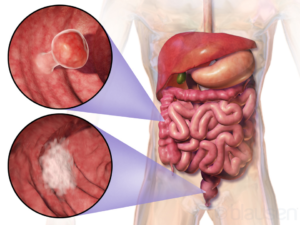Anal Cancer Surgery in Delhi
Anal cancer, though rare, remains a critical health concern worldwide. Characterized by the abnormal growth of cells in the anus, this condition affects a relatively small number of individuals, with approximately 600 new diagnoses reported globally in 2023. While its occurrence is infrequent compared to other cancers, understanding the signs and treatments for anal cancer is crucial for early detection and effective management.
Recognizing the symptoms of anal cancer, such as lumps or ulcers around the anus, discomfort, or bleeding during bowel movements, is pivotal. Additionally, being aware of available treatment options like radiation therapy, chemotherapy, and surgery forms an essential part of managing this condition.
Reach Out for Expert Care
What is Anal Cancer?
Anal cancer is a cancer that affects the tissues of the anus. Most anal cancers are squamous cell carcinomas (SCC). Squamous cells are a type of cell that line the surface of the anal canal.
Some anal cancers are adenocarcinomas of the anus, a cancer of the cells that make the mucus that helps the stools (feces) move smoothly out of the anus. In rarer cases, some SCCs affect the skin outside the anus (perianal skin cancers).
Dr. Deep Goel has treated numerous cases of anal cancer with a high success rate. He specializes in advanced treatments like chemotherapy, radiation therapy, and surgeries. With his expertise, Dr. Goel has helped many patients manage anal cancer effectively, offering hope and positive outcomes.
What are Its Signs And Symptoms?
The symptoms can include:
- Lumps around the anus or in the groin
- Ulcers around the anus
- Pain, discomfort, or itching around the anus
- Blood or mucus in stools (feces) from the anus
- Difficulty controlling your bowel movements
- A feeling of fullness, pain, or discomfort in the rectum
Other conditions, such as hemorrhoids or tears in the anal canal, may cause these symptoms. However, if symptoms persist, see your doctor for a check-up.
Dr. Deep Goel says almost 90% of anal cancer cases are caused by the human papillomavirus (HPV). He advises avoiding smoking, anal sex, and having a weak immune system to lower the risk. He mentions getting an HPV vaccine and regular check-ups can help prevent anal cancer.
How is Anal Cancer Diagnosed?
Tests to diagnose anal cancer may include:
-
Physical examination
The doctor conducts a digital anorectal examination (DARE) by inserting a gloved finger into your anus to check for any swelling or lumps.
-
Biopsy
A doctor uses a sigmoidoscope or colonoscope to examine your anal canal. They take a tissue sample (biopsy) for laboratory testing. If anal cancer is detected, you may have scans to see if the cancer has spread to other parts of your body. These may include:
- MRI: A magnetic resonance imaging (MRI) scan uses a powerful magnet and radio waves to create 3D pictures of areas inside the body. Sometimes, dyes are injected into a vein to make the images more transparent.
- Endorectal ultrasound: In this, an ultrasound probe is inserted through the anus into your rectum. This can be uncomfortable but is usually not painful. The probe sends soundwaves that echo when they meet something dense, like a tumor, and images are projected onto a computer screen.
- CT scan: A computerized tomography (CT) scan uses X-rays and a computer to create a detailed picture of an area inside the body. Before the scan, the dyes are injected into a vein to make the images clearer.
What are the Available Treatments for Anal Cancer?
Anal cancer is rare, so it is usually recommended that you be treated in a specialized center by a multidisciplinary team.
a) Staging
Staging indicates determining the size of the cancer and how far it has spread. Most people with anal cancer receive a combination of chemotherapy and radiation therapy (radiotherapy) treatments at the same time, called chemoradiation. Surgery may also be used. This will depend on the type and stage of anal cancer you have.
b) Radiation therapy (radiotherapy)
Radiotherapy utilizes X-rays to eliminate or damage cancer cells and can be administered externally using machines targeting the cancer and surrounding tissue. Alternatively, brachytherapy involves placing radioactive material in thin tubes near the cancer internally for localized treatment.
c) Chemotherapy
Chemotherapy can be used alone or combined with radiation therapy (chemoradiation) to treat anal cancer. Chemotherapy is usually given as a drug that is injected into a vein (intravenously). For chemoradiation treatment, radiation therapy starts the same day as the first cycle of chemotherapy commences. Radiation therapy is delivered every weekday for about five to six weeks. Side effects have been significantly reduced since the introduction of a focused radiotherapy called intensity-modulated RT (IMRT).
d) Surgery
Surgery may be used to treat anal cancer if it is in the early stages, or hasn’t completely gone after chemoradiation, or it comes back after treatment (recurs). The type of surgery will depend on the size and type of the cancer. An early-stage tumor that doesn’t affect the muscles around the anus may be operable as a local resection, where the affected area is removed.
A more extensive operation called an abdominoperineal resection, may be required if the cancer is present after initial treatment or if you are unable to have chemoradiation. This procedure involves the removal of the anus, rectum, and part of the colon, and possibly lymph nodes near the anus and groin. If you have this procedure, you will have a permanent stoma (colostomy). Before and after your surgery, a stoma nurse will assist you in what is involved in living with a colostomy.
e) Palliative care
In some cases of anal cancer, your medical team may talk to you about palliative care. Palliative care aims to improve your quality of life by alleviating symptoms of cancer. As well as slowing the spread of anal cancer, palliative treatment can relieve pain and help manage other symptoms. Treatment may include radiotherapy, chemotherapy, or other drug therapies.
Dr. Deep Goel typically suggests a combined approach for treating anal cancer, using chemotherapy and radiation therapy (chemoradiation). He believes this combination effectively targets cancer cells while minimizing damage to healthy tissues. Surgery may be considered depending on the cancer’s stage and type. Dr. Goel aims to provide comprehensive treatment, focusing on the best patient outcomes.
“Dr. Deep Goel’s care was reassuring and effective, guiding me through anal cancer treatment with patience and expertise,” stated a happy patient of Dr. Deep.
Another satisfied patient mentioned, “Grateful for Dr. Deep’s compassion and expertise, making my anal cancer treatment journey smoother and more manageable.”
How Much Does an Anal Cancer Treatment Cost in India?
In India, the cost of treating anal cancer for Indian patients ranges from Rs. 70,000 to Rs. 88,000. For international patients, the cost varies between USD 1,300 to USD 1,600. These costs cover radiation therapy, chemotherapy, surgery, and other necessary treatments. It’s essential to note that the exact expenses may differ based on individual needs, hospitals, and any additional care required during the treatment process.
Final Thoughts
Knowing the signs and treatments for anal cancer is super essential for catching it early and getting the right help. Spotting symptoms like lumps, pain, or bleeding around the anus is crucial for getting checked by a doctor. Treatments like radiation, chemo, or surgery can help manage anal cancer. Understanding these things can help people identify issues early and explore the best ways to treat anal cancer for a better chance of getting better.
Related Blogs

Is Anal Cancer Surgery Safe? Understanding the Risks and Benefits
Anal cancer is a relatively rare but challenging diagnosis. When conservative treatments like radiation and…
Read Article →
Can Surgery Cure Anal Cancer Completely? – Dr. Deep Goel
Anal cancer is a rare but increasingly prevalent cancer that originates in the tissues…
Read Article →